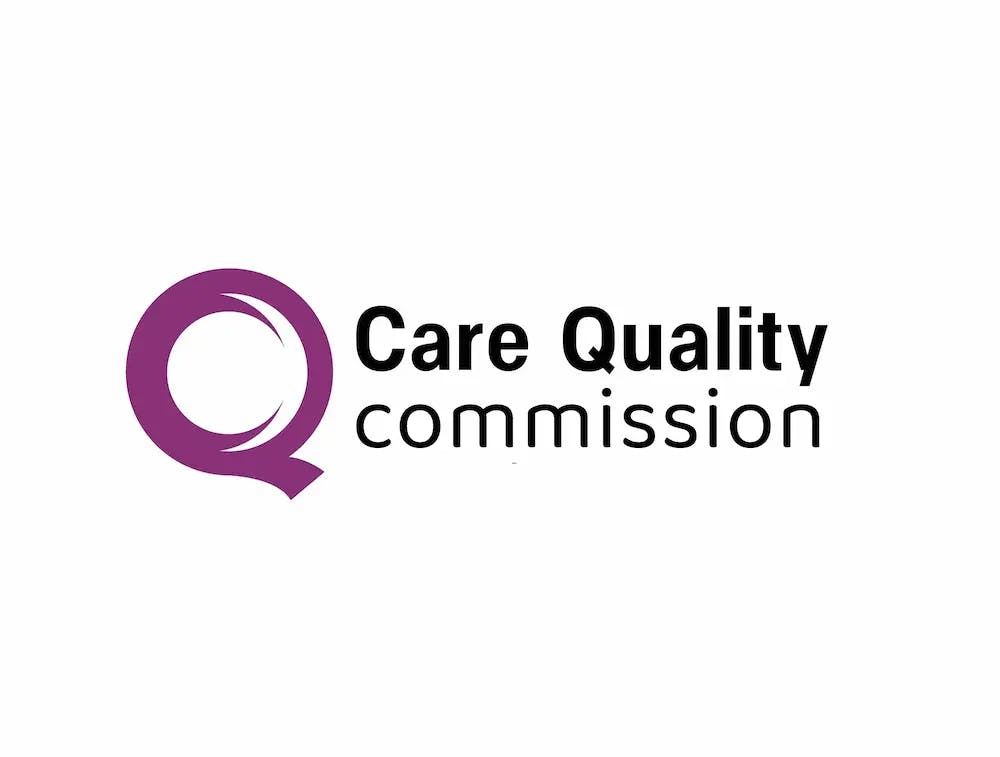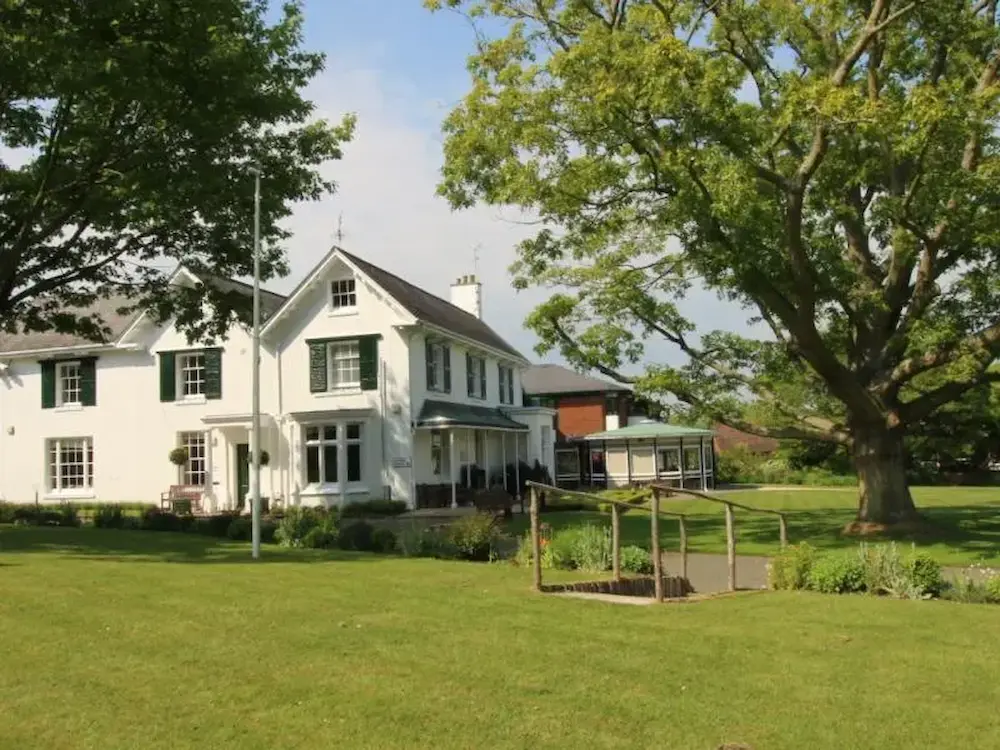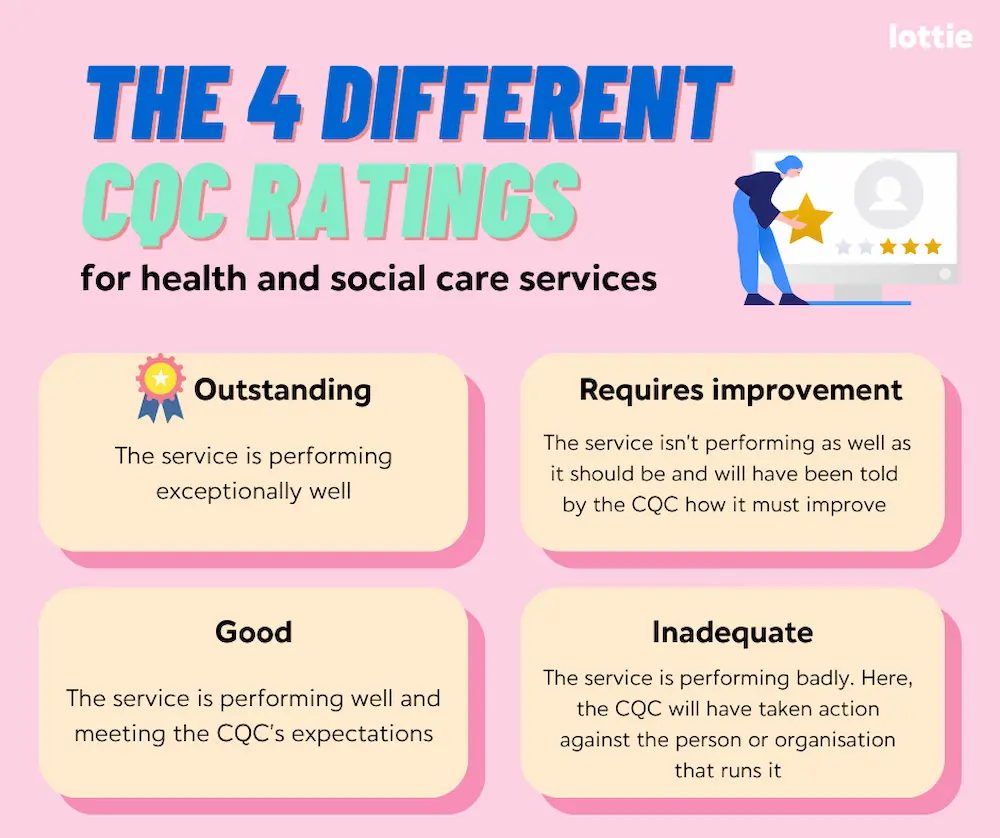What Is the Care Quality Commission (CQC)?

Estimated Reading Time: 11 minutes
The Care Quality Commission (CQC) is England’s independent regulator of health and social care. The CQC has a few roles within care homes and the care sector as a whole, including ensuring these facilities meet the necessary standards of social care in England so the services they provide to residents are as good as they can be!
Setting standards is what helps to drive up the quality of care within the sector, so every home provides the best level of support for every resident.
In this article, we’ve explained exactly who the Care Quality Commission are and what they do, its five main standards, what power they have and the ratings they give to care providers.
Kickstart your care search
Discover the best care homes in your area through Lottie.
In this article:
- What does the Care Quality Commission do?
- What is the CQC in care homes?
- The 5 care quality commission standards
- What do care homes have to report to the CQC?
- What other types of care does the CQC look at?
- What is the Care Quality Commission’s role in safeguarding?
- What power does the Care Quality Commission have?
- CQC ratings
- Guidance for service providers
What Does the Care Quality Commission Do?
The Care Quality Commission (CQC) is the independent regulator of health and social care providers in England. The CQC ensures that these care providers are meeting the necessary standards through monitoring and inspections.
These inspections check whether care providers are meeting the fundamental standards for quality and safety.
The CQC will publish their findings and performance ratings after making an inspection.
The CQC regulates:
- Health and social care services in England (such as hospitals, clinics, dentists and GP practices)
- Health and social care services in England specifically for older adults in care homes and within people’s homes (such as home care)
- Health and care services for young people (under 18) in England
What Is the CQC in Care Homes?
CQC inspectors will aim to inspect all new care homes within 6-12 months of opening. They will remain ungraded until they’ve had this first inspection and subsequent report.
Care home inspections are usually unannounced and allow the CQC to keep a keen eye on standards while also following up on any complaints or issues that were flagged.
You can use the Care Quality Commission to review any care home. Here, you can see what rating the home has been given (you can also do this through Lottie) and read the independent, professional review of the care home. Having this information can prove invaluable when comparing care homes.
If a care home has a rating of ‘requires improvement’ or ‘inadequate’ (more on these ratings later), the CQC will be closely monitoring them and regularly checking to see if improvements have been made. The CQC report will detail any action being taken to improve the service.

The 5 Care Quality Commission Standards
When CQC inspectors evaluate a care service (such as a care home), they’re broadly guided by five things - the CQC Standards. These are the minimum requirements that a care provider must be meeting to provide quality care to its residents, along with a welcoming environment for staff to work in.
The 5 Care Quality Commission Standards are:
1. Safe
Are care seekers, care home staff and visitors protected from harm?
2. Effective
Is the care, treatment and support offered achieving a good outcome? Is the quality of life for care seekers being improved?
3. Caring
Do staff involve their residents and treat them with compassion and dignity? Does the care facility as a whole have a caring culture?
4. Responsive
Are services able to effectively meet your needs? Are they able to adapt if needs or preferences change?
5. Well Led
Are the leadership team and management of the care facility doing a good job of delivering excellent person-centred care?
What Do Care Homes Have to Report to the CQC?
Here’s what has to be reported to the Care Quality Commission:
Abuse or allegations
Care providers have to make the CQC aware of any abuse allegations within their service. Doing this is tied to providers ensuring they’re properly safeguarding people using their services.
Incidents reported to or investigated by the police
The police and the CQC don’t share information which is why the care provider needs to instead pass this information onto the CQC.
Serious injuries
The CQC defines a serious injury as one that permanently impairs functions or causes prolonged pain.
Deaths of service users
Larger homes and other care providers will almost always have systems in place for monitoring this. However, all providers must immediately report deaths to the CQC.
Applications to deprive somebody of their liberty
Applying to deprive someone of their liberty for treatment under the Mental Capacity Act 2005 must be reported to the CQC.
Events that prevent or threaten the registered person from safely carrying out an activity to an appropriate standard
When dealing with an event like a flood, fire or financial crisis, the CQC need to be informed. The CQC are really useful in these situations, as they can help find alternative services or accommodation for service users.
Unauthorised absences
Recording absences of people detained under the Mental Health Act is a longstanding duty of the CQC.

We’re here to help you find the right care home for you or your loved one. You can request a free list of care homes from our Care Experts, who will then share homes matching your budget, location and type of care needed. You can also search for care through our easy-to-use directory.
What Other Types of Care Does the CQC Look At?
The Care Quality Commission doesn’t just look at the different types of care homes, but regulates England’s health and social care sector as a whole.
Here are two other types of care services that the CQC will inspect and how inspections are carried out:
1. Community adult social care services
The CQC can inspect domiciliary care agencies, independent living, Shared Lives schemes, sheltered housing, warden controlled housing and similar forms of adult care services that are often aimed at retirees.
These inspections are normally announced 48 hours in advance to make sure a manager will be present.
2. Hospice services
Hospice services included both community-based and day hospice services. Here, there's usually two days notice given for inspections. The main reason is to make sure a manager is present on the day of the inspection.
The CQC also inspects:
- Clinics
- Dentists
- GP services
- Hospitals
- Ambulances
- Mental health services
- Home services
- Temporary care services (such as convalescent care)
What Is the Care Quality Commission’s Role in Safeguarding?
The Care Quality Commission monitors, inspects and regulates services to make sure they’re meeting the fundamental standards of quality and safety. When it comes to safeguarding, this is done by:
- Checking whether care facilities have effective systems and processes in place to keep people safe
- Monitoring information regarding safeguarding to assess whether adults or children using services are at risk. If this might be the case, then the CQC will make sure the right people act at the right time to keep them safe
- Acting quickly on any safeguarding issues that come up, including flagging them with the care provider (and the local authority or police if necessary)
- Speaking with care seekers who are using a care service, as well as their carers and families
- Holding providers to account by taking action to ensure they quickly amend any issues involving safeguarding
- Publishing findings about safeguarding in inspection reports
- Supporting local authorities when they conduct inquiries regarding the safeguarding of adults or children. The CQC will share information where it’s relevant and needed

What Power Does the Care Quality Commission Have?
The Care Quality Commission uses its powers to:
- Protect you from harm and ensure that you receive care which is up to scratch
- Ensure services improve if the standard of their care has fallen below acceptable levels
- Hold care providers, leadership and management accountable for failures in how care is provided
The action that the CQC takes will depend on how people are affected by the identified problems and how serious they are.
The actions that the CQC can take include:
- Using requirement notices or warning notices to highlight what improvements a care provider needs to make and when these changes need to be done by
- Making changes to a care provider’s registration. Doing this can limit what they’re able to do e.g. imposing certain conditions for a given amount of time
- Placing a care provider in ‘special measures’. This means that the quality of care they provide will be closely supervised while other organisations work alongside them to help improve this
- Holding care providers to account for their failings by issuing cautions, fines or taking legal action when people are harmed or put in harm’s way
CQC Ratings
Most CQC inspection reports will include ratings. These can be used by care seekers to compare services or care homes and make choices about the type of care they want.
There are four ratings that the CQC gives to health and social care services within a report. These are:
1. Outstanding
The service is performing exceptionally well.
2. Good
The service is performing well and meeting the CQC’s expectations.
3. Requires Improvement
The service isn’t performing as well as it should be. In this case, the service will have been told by the CQC how it must improve.
4. Inadequate
The service is performing badly. Here, the CQC will have taken action against the person or organisation that runs it.

Not Yet Inspected
A home will be classed as 'Not Yet Inspected' if it's new and hasn't yet been reviewed by the CQC. The CQC aims to review new care homes within 6-12 months of opening, but it often ends up taking longer than this.
The Care Inspectorate
The Care Inspectorate is the Scottish equivalent of the CQC. This regulatory body monitors the standard and supports the improvement of care services such as care homes in Scotland.
Just like the CQC, the Care Inspectorate inspects care services and then grades them across a variety of criteria, based on how well they're performing. There's also the Care Inspectorate Wales which is the Welsh equivalent of the CQC.
The Care Inspectorate supports services, providers and partnerships to help make changes that improve the quality of care, focusing on areas like person-centred innovation and involving residents in the decision making process.
You can find a care service and their inspection reports here.
Guidance for Service Providers
By law, care providers have to display the ratings they’re given by the CQC. Our care home directory also displays CQC ratings. This includes showing the rating on a website if you have one.
Achieving an all-important ‘Outstanding’ rating is a desirable yet completely achievable goal for care providers.
Looking again at the CQC’s five standards, here’s what you can do as a care provider to work towards this rating:
1. Safe
All members of staff should fully understand incident reporting and similar procedures. Keeping a log of these incidents will indicate better culture and accountability, especially when everything is stored digitally as this is usually the easiest way to log data.
2. Effective
Ensure that your guidelines and policies include evidence-based guidance and national recommendations such as those from the National Institute for Health and Care Excellence (NICE). You should aim to improve the standard of support offered through innovations, better teamwork and by generally finding more efficient ways of working.
3. Caring
If you’re a care home then you should be actively seeking out the opinions of your residents as to how the services offered could be improved. CQC inspectors will be looking at how staff are caring for residents in relation to guidelines.
4. Responsive
When delivering care, the needs of residents and other care seekers should be met on an individual basis. This includes involving them in the caregiving process and responding to their changing needs.
5. Well Led
Having great leadership is really important. This leadership should trickle down to a passion among all staff members to provide amazing, person-centred care. Including your staff in decision-making and ensuring everyone is up to date with the latest training will definitely help with this.
Lottie matches care seekers with the best care homes for their needs. You can request a free care home shortlist from our Care Experts, who will share homes matching your budget, location and type of care needed. You can also search for care through our easy-to-use directory.
Frequently Asked Questions
What are the three values of the CQC?
The three values of the CQC are ‘Excellence’ - being a high-performing organisation, ‘Caring’ - treating everyone with dignity and respect, and ‘Integrity’ - doing the right thing.
Is the Care Quality Commission part of the NHS?
The Care Quality Commission is an organisation that serves as the independent regulator of all health and adult social care services in England, whether provided by the NHS, local authorities, private companies or voluntary organisations. So, the Care Quality Commission isn’t part of the NHS.
Why is the CQC important?
The CQC is a very important organisation that serves as the independent regulator of health and social care in England. The CQC ensures health and social care services are safe, compassionate, of a high quality, effective and meeting legal standards. These regulations allow the public to make informed decisions when picking a care provider.




